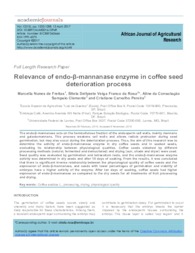Relevance of endo-ß-mannanase enzyme in coffee seed deterioration process.
Relevance of endo-ß-mannanase enzyme in coffee seed deterioration process.
Author(s): FREITAS, M. N. de; ROSA, S. D. V. F. da; CLEMENTE, A. da C. S.; PEREIRA, C. C.
Summary: The endo-?-mannanase acts on the hemicellulose fraction of the endosperm cell walls, mainly mannans and galactomannans. This process weakens cell walls and allows radicle protrusion during seed germination, but may also occur during the deterioration process. Thus, the aim of this research was to determine the activity of endo-?-mannanase enzyme in dry coffee seeds and in soaked seeds, evaluating its relationship between physiological qualities. Coffee seeds obtained by different processing methods (natural, fermented and demucilated) and drying (sun, shade and dryer) were used. Seed quality was evaluated by germination and tetrazolium tests, and the endo-?-mannanase enzyme activity was determined in dry seeds and after 10 days of soaking. From the results, it was concluded that there is significant inverse relationship between the physiological quality of coffee seeds and the expression of endo-?-mannanase, and seeds with lower percentages of germination and viability of embryos have a higher activity of the enzyme. After ten days of soaking, coffee seeds had higher expression of endo-?-mannanase as compared to the dry seeds for all treatments of fruit processing and drying.
Publication year: 2017
Types of publication: Journal article
Unit: Embrapa Coffee
Keywords: Drying, Endosperm, Hemicellulose, Physiological quality, Processing
Observation
Some of Embrapa's publications are published as ePub files. To read them, use or download one of the following free software options to your computer or mobile device. Android: Google Play Books; IOS: iBooks; Windows and Linux: Calibre.
Access other publications
Access the Agricultural Research Database (BDPA) to consult Embrapa's full library collection and records.
Visit Embrapa Bookstore to purchase books and other publications sold by Embrapa.

